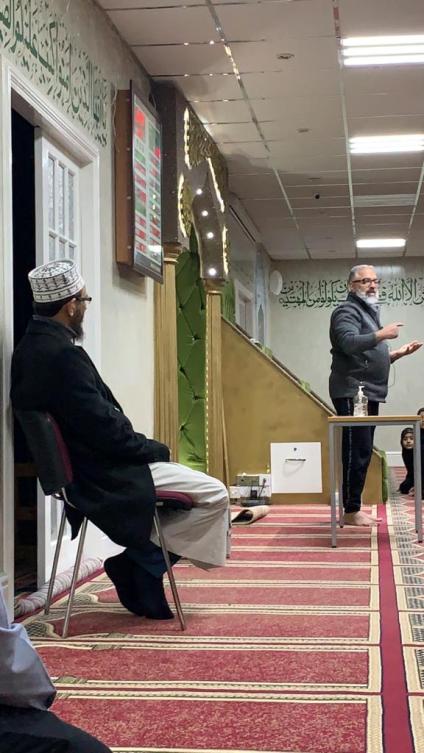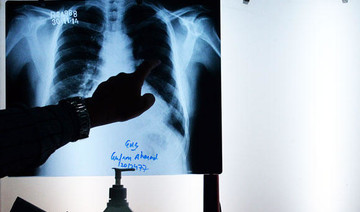LONDON: A mosque in northwest England will open its doors to end-of-life patients at the end of April, in a community initiative that aims to free up hospital beds amid the coronavirus outbreak.
Masjid E Ghosia in Bolton temporarily closed to worshippers ahead of a lockdown in Britain that came into force on March 23 to prevent the spread of the virus.
But its hall and 12 rooms, which are normally used for community functions and children’s Islamic classes, will instead provide end-of-life care to 23 people who need it, under the guidance of Dr. Mohammed Jiva MBE, 50, who came up with the initiative and is leading it.
He is being supported by a group of Muslim doctors, including Dr. Zahid Chauhan OBE, whose work with the homeless has been recognized by the queen, Bolton Local Medical Committee Chairman Dr. Sharif Uddin, and Dr. Rauf Munshi, a consultant acute physician at the Bolton National Health Service (NHS) Foundation Trust.
Jiva, a fulltime GP who is also CEO of the Rochdale and Bury Medical Committee and the British Hajj delegation, came up with the idea of using the mosque premises to care for patients for whom hospitals feel they cannot do much.
He said he wanted the mosque to continue being a community hub during the coronavirus pandemic, and to use its facilities to look after end-of-life patients to reduce the burden on local hospitals.
The idea was enthusiastically agreed to by the mosque committee, which had invited Jiva to advise them on putting in place restrictions to prevent the spread of COVID-19 before the lockdown was announced.
“The committee wanted to see the mosque used for all faiths, not just Muslims, and give back to the community — not just the Muslim community but also the wider community,” he told Arab News.
“They wanted the community to see that when it really comes down to a crisis, the mosque, its committee and its facilities are there at the community’s disposal to help it out.”
Jiva said based on experiences of countries such as Italy, Spain and France, the UK will struggle for health care facilities when it reaches the peak of the coronavirus outbreak.
“It’s likely that there are certain cohorts of our community who are automatically going to be refused access to interventional health care because of their ages or their longstanding medical problems,” he said.
“Difficult decisions are being made across the country about who out of a group of people will be given a ventilation bed based on the probability of their recovery. It’s a difficult decision and an ethical one that hospitals will have to make,” he said.

Dr. Mohammed Jiva teaches children who attend classes at the mosque how to wash their hands properly before the coronavirus lockdown. (File/Supplied)
“If hospitals have patients who they feel they can’t do much for, they can discharge them. If discharging them back home or into care homes isn’t an option, they may want to consider using us, and we’ll provide them with care,” he added.
“Although we’d prefer for people to be looked after in their homes, there will be cases of patients where the home environment isn’t adequate because they live alone, for example,” Jiva said.
“Even when the lockdown ends, there may be people who need to go out and work and can’t stay at home for 14 days because their end-of-life loved one has suspected or diagnosed COVID-19. If these patients came and stayed with us, their family would still be able to leave the house and go to work or wherever else they need to go.”
Jiva said the response to his call for volunteers and donations to man and fund the initiative has been overwhelming, with 60 people volunteering their services and £10,000 ($12,485) raised in donations within weeks.
He has received calls and emails from all sections of society since writing a letter asking for people to volunteer.
Volunteers include GPs, hospital doctors, nurses, opticians, orthoptists, pharmacists, non-medical professionals, and people who have no health care experience but are willing to use their facilities to help the project.
“For example, one of the main volunteers who works with me at the moment has a fleet of cars and vans that are grounded because of the lockdown, and he said he’d fulfil our transport needs — whether that be transporting goods or patients for free,” Jiva said.
“When the call for donations went out, we received thousands of pounds to help us buy the beds, chairs, desks, drugs cabinets, defibrillator machines and other things we needed to buy. It also gives us flexibility to employ professional staff to work at certain times of the day when we can’t staff the venue, especially as this will be an overnight facility. Many volunteers offer their services during the day and can’t work during the evenings.”
When asked how overstretched doctors and health care workers will find the time to volunteer at the mosque, Jiva said a rota system for volunteers that he is developing will allow the smooth running of the facility and highlight gaps in the provision of care that may need to be filled.
“Certain doctors and health care staff have half days or days off from their work, during which they’ll volunteer. This is where we need to get the rota in place, so we can find the voids where we may need to incorporate professional employed staff to make sure we have 24/7 cover,” he added.
“We have over 60 volunteers for now. If we need volunteers they’ll be forthcoming, and if we need funding that will also be forthcoming.”
























